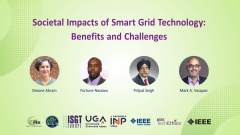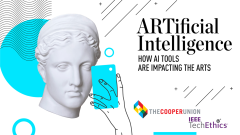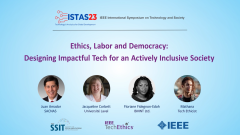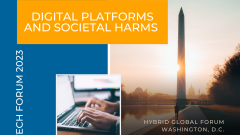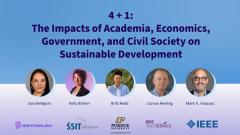Global Environmental Solutions | Session 1: New Technologies & Related Social Impacts | IEEE TechEthics & UN-DESA
About the Video: This session addresses new technologies that are providing solutions to key global environmental concerns, with a particular focus on oceans, transportation and manufacturing, including related societal considerations.
About the Event:
Part of a new series of online events conceived by IEEE TechEthics and UN-DESA as a way to facilitate and share technology solutions and promote substantive discussions among policy makers, engineers, legal experts, ethicists, social scientists, and others on a variety of topics related to the UN Sustainable Development Goals. This event in the series focused on Global Environmental Solutions.
View/download session 1 handouts (PDF)
About the Speakers:
- In 2016, Susan Baer co-founded Clear Blue Sea, a nonprofit with a mission to cleanse the oceans of plastic pollution. Clear Blue Sea’s innovation is the Floating Robot for Eliminating Debris (FRED), which is designed to collect marine debris in lakes, rivers, bays, and oceans. Susan mentors over 100 student interns working on Clear Blue Sea engineering, robotics, fundraising, business management, and educational programs. Susan has an economics degree from UCSC, an MBA from Yale University, and is PMP-certified. She served as a Program Manager at UCSC and Booz Allen, and then at SAIC for 20 years as a VP of Program Management. Susan started-up and managed SAIC’s NASA Informational Technology Division and managed NASA Programs for the International Space Station Engineering Management System; Modernization of the Mission Control Center; and Improved Safety, Reliability and QA Information Architecture following the Challenger tragedy. In the last 5 years, Susan has been teaching a course in “Innovation and Creativity” at SDSU for the Fowler College of Business and developing training programs for local small business startups.
- Anibal T. De Almeida (PhD) is a Full Professor in the University of Coimbra, Portugal, and Director of the Institute for Systems and Robotics, an interdisciplinary research institute with over 150 researchers, being involved in research activities in the areas of automation, robotics and energy-efficient technologies in industry. He has been responsible for over 50 funded national and international projects in the areas of industrial automation technologies and energy efficient technologies with particular emphasis in advanced electric motors and drives. He was the founder and organizer of the first e conference series EEMODS – Energy Efficient Motors and Drives Systems, in September 1996 in Lisbon, a global, biannual event attracting motors and drives experts from all over the world. He is co-author of six books and over 300 refereed papers in international journals and conferences with over 4800 SCOPUS citations. He is the Co-Chairman of the Technical Committee on Energy, Environment and Safety of the IEEE Robotics and Automation Society. He is a consultant of international institutions including the European Commission, US Department of Energy, US Agency for International Development, American Council for an Energy-Efficient Economy, California Institute for Energy Efficiency, Electric Power Research Institute, Lawrence Berkeley Laboratory, UNDP, UNIDO, UNEP and CLASP. He is member of the Board of Directors of CLASP (Washington, USA), a major global player to advance sustainable energy technologies and to promote energy access around the World.
- Ryan Janzen is a scientist, engineering researcher, and entrepreneur. Featured on the Discovery Channel, Wired magazine, and Through the Wormhole, Janzen's innovations have been featured in 110+ international lectures, media interviews, and scientific publications. Janzen's work has led to entirely new fields of research, including extramissive optics, veillance flux, swarm modulation, and the world's first aircraft PLC research. His innovations have led to advances in acoustics, aerospace electronics, mathematics, and vehicle propulsion. Janzen is co-founder and CTO of TransPod, designing a next generation of ultra-high-speed aerospace vehicles, to move passengers and cargo between cities at over 1000 km/h. Janzen is the chief architect of the multi-billion-dollar future system: transportation infrastructure, operations, aerodynamics, propulsion and avionics.
- For more than 17 years, Adrian Martinez has advocated to clean up the notoriously smoggy skies in the Los Angeles region. Through this work, he has represented and partnered with a wide range of organizations, including environmental, health, labor, and community groups. Adrian currently works as an attorney in the Right to Zero campaign at the nonprofit environmental law firm Earthjustice. The Right to Zero campaign advocates for zero-emissions in our transportation system, energy system, and our buildings. Adrian has particular expertise in advancing solutions to clean up the transportation system. He was the first attorney hired in Los Angeles for Earthjustice and helped the organization expand its presence in the Los Angeles region. He also serves as chair of Earthjustice’s Transportation Practice Group. Prior to joining the Los Angeles office of Earthjustice, Adrian worked at the Natural Resources Defense Council. He started his legal career as the F.A.O. Schwarz Legal Fellow before securing permanent positions working on clean air and healthy communities issues. He worked at NRDC for more than 9 years. He focused on litigation and advocacy to clean up some of the largest sources of pollution in California, including the Ports of Los Angeles and Long Beach. Adrian also serves as an adjunct professor of law at the University of California Los Angeles where he co-teaches a seminar on environmental justice law. He also serves on the Advisory Board of UCLA Law School’s Emmet Institute on Climate Change and the Environment. Adrian also frequently lectures at law conferences related to air quality, energy and climate issues. He has received awards from several organizations, including but not limited to, the Harbor Community Benefit Foundation and East Yard Communities for Environmental Justice.
- Richard A. Roehrl is a scientist, economist and policy analyst. At present, he is a Senior Economic Affairs Officer in the United Nations Department of Economic and Social Affairs where he is responsible for science, technology and infrastructure issues. He works towards strengthening the science-policy interface and has supported the creation of a number of new entry points for science and technology stakeholders at the United Nations. In particular, he initiated the UN Technology Facilitation Mechanism and the UN Global Sustainable Development Report, among others. Mr. Roehrl has advised governments, supported negotiations and engaged with science communities on a wide range of issues. He has led analytical work and assessments on sustainable development, technology change and foresight, emerging science, cross-border infrastructure, energy, climate and scenario analysis. Mr. Roehrl received his education from the Ludwig-Maximilians-Universität München, the University of Oxford, the University of London, and the University of Erlangen-Nuremberg.
- Dan Shahar is Assistant Professor of Philosophy—Research at the University of New Orleans and a member of the Urban Entrepreneurship & Policy Institute. Before arriving at UNO, he received his PhD in Philosophy from the University of Arizona in 2017 and then served as a visiting faculty member in the Philosopy, Politics, and Economics program at the University of North Carolina at Chapel Hill. Shahar's research focuses on the implications of environmental challenges for liberal societies and their members. His paper, “Harm, Responsibility, and the Far-off Impacts of Climate Change,” won the International Society for Environmental Ethics’ Holmes Rolston III Early Career Prize in Environmental Philosophy. With David Schmidtz, he is also co-editor of the latest edition of the popular textbook, Environmental Ethics: What Really Matters, What Really Works. Shahar teaches courses in ethics, political philosophy, and political economy.
- Mark A. Vasquez (moderator) is a Certified Association Executive (CAE) with over 25 years of experience in association management at IEEE. He currently serves as the senior program manager for IEEE TechEthics, a program that drives conversations about the ethical and societal impacts of technology. In this capacity, he works to develop relationships with others in the technology ethics community, produces events, convenes thought leaders, and more. Mark is an engineering graduate of The Cooper Union.
Recorded on 10 March 2021.
About the Video: This session addresses new technologies that are providing solutions to key global environmental concerns, with a particular focus on oceans, transportation and manufacturing, including related societal considerations.
 Cart
Cart Create Account
Create Account Sign In
Sign In

